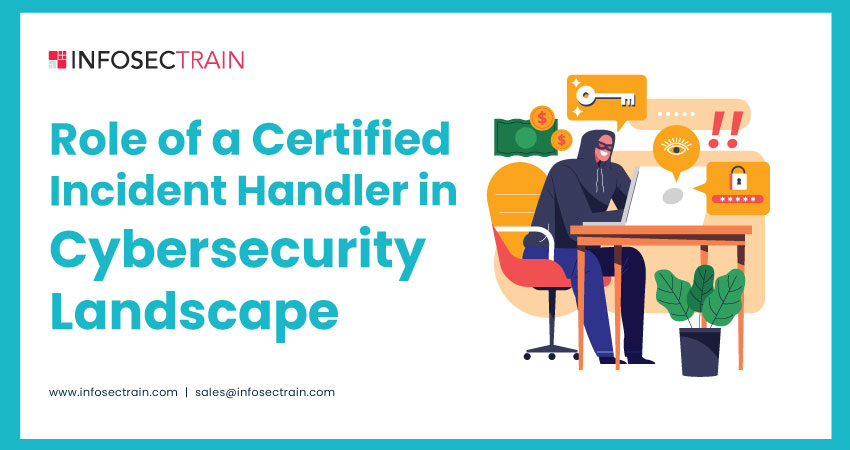Role of a Certified Incident Handler in Cybersecurity Landscape
In digital threats, Certified Incident Handlers (CIH) are like protectors. They have special training to deal with and handle cyber problems quickly. CIH experts do more than respond to incidents; they protect essential information, ensure businesses keep running smoothly, and lessen the impact of security issues. Imagine them as frontline defenders, not just fixing issues but also ensuring organizations are strong against all cyber problems. When businesses invest in CIH professionals, they’re giving themselves the power to strengthen their digital security and confidently handle the tricky world of the internet.

Who is a Certified Incident Handler?
A cybersecurity specialist, known as an incident handler, focuses on recognizing, analyzing, and addressing security incidents within an organization. As the initial defense line, they actively strive to contain the impact, investigate the attack’s origin, and promptly restore regular operations. Their role is pivotal in swiftly responding to and managing security threats, ensuring the organization’s resilience in the face of cyber attacks.
Roles and Responsibilities of a Certified Incident Handler?
1. Incident Identification and Analysis: CIHs monitor systems to detect signs of any suspicious activity. They analyze logs and data to understand the incident’s scope and nature. Taking decisive action, CIHs then determine the best response to address and mitigate the identified security threat effectively. Their hands-on approach ensures a swift and informed reaction to potential incidents, enhancing the organization’s overall cybersecurity posture.
2. Reporting and Communication: CIHs document incidents, report them to management and relevant authorities and update involved stakeholders. This approach ensures comprehensive reporting and facilitates clear communication with key decision-makers and external entities. This active involvement strengthens the incident response process and contributes to effective cybersecurity management.
3. Containment and Eradication: They swiftly take action to prevent additional damage from the attack by isolating infected systems or shutting down affected services. This approach aims to contain the incident and eradicate potential threats promptly. CIHs play an active role in swiftly addressing security breaches, minimizing the impact, and ensuring a controlled response to protect the organization’s assets.
4. Recovery and Remediation: They actively recover affected systems and data, mitigate losses, and implement security enhancements to prevent the recurrence of similar incidents. Their focus is on restoring normal operations while simultaneously addressing vulnerabilities. CIHs play an integral role in the recovery and remediation process, ensuring a resilient cybersecurity framework for the organization moving forward.
5. Investigation and Evidence Collection: CIHs investigate incidents, collecting evidence to identify attackers, comprehend their motives, and prevent future attacks. Their role involves a hands-on approach to uncovering crucial details that enhance cybersecurity measures. By engaging in investigation and evidence collection, CIHs are essential to maintaining a stance against potential threats, contributing to the organization’s overall security resilience.
Why is a Certified Incident Handler Important in the Cybersecurity Landscape?
1. Minimizing the Impact of Cyberattacks: CIHs, through their rapid response and specialized knowledge, can notably shorten the duration to contain an attack and restore regular operations, effectively curbing damage and financial losses. They possess the skills to isolate infected systems, block lateral movement, and eliminate malware, thereby reducing the attack’s reach and safeguarding sensitive data. This active intervention minimizes the impact of cyberattacks, showcasing the valuable role CIHs play in fortifying organizational defenses.
2. Expertise and Skillset: CIHs combine a distinctive technical understanding, analytical prowess, and problem-solving skills. They excel in maneuvering through intricate systems, scrutinizing attack logs and forensics data, and crafting responsive strategies. This expertise plays a critical role in comprehending the characteristics and extent of an attack, enabling them to make informed decisions and efficiently implement effective recovery measures.
3. Protecting Sensitive Information: As custodians of confidential information, CIHs shield it from unauthorized access or disclosure in the face of cyberattacks. This protection protects organizations from privacy breaches, reputational harm, and legal ramifications. Through meticulous investigations and evidence collection, they ascertain attackers’ identities, fostering deterrence and ensuring accountability for justice. Their proactive role is instrumental in upholding the integrity of sensitive data.
4. Preventing Future Attacks: CIHs review previous incidents, pinpoint vulnerabilities, and enable organizations to address weaknesses, enhancing their security. This proactive strategy effectively thwarts the recurrence of similar attacks. Remaining abreast of the latest threats and attack techniques, CIHs ensure organizations are well-prepared and resilient in the face of evolving cyber threats. Their active role contributes to a vigilant defense against potential future attacks.
What are the Prerequisites for a Certified Incident Handler?
1. Formal Education:
- Though not mandatory, acquiring a bachelor’s degree in computer science, information security, or a related field provides a solid foundation in cybersecurity concepts.
- Organizations often favor candidates with pertinent certifications, including:
- GIAC Certified Incident Handler (GCIH): A thorough certification encompassing all facets of incident handling.
- EC-Council Certified Incident Handler (ECIH): Emphasizing practical skills and tools for incident response.
- SANS GIAC Security Essentials Certification (GSEC): Providing a comprehensive understanding of cybersecurity concepts and a sturdy foundation for further specialization.
2. Technical Skills and Knowledge:
- Demonstrating proficiency in operating systems, network protocols, and security tools is crucial.
- Familiarity with incident response methodologies, forensics techniques, and malware analysis is essential.
- Adept knowledge of vulnerability management, risk assessment, and security best practices is required.
- The ability to script and employ various command-line tools for automation and analysis is crucial.
3. Soft Skills and Abilities:
- Excellent analytical and problem-solving skills are vital for evaluating complex situations and formulating effective response plans.
- Strong communication and collaboration skills are necessary for seamless interaction with diverse teams and stakeholders, especially under pressure.
- Swiftly grasping and adjusting to emerging technologies and threats is a valuable skill.
- Maintaining a composed and concentrated demeanor is crucial to managing high-pressure situations effectively.
4. Experience:
- While specific entry-level roles may not demand experience, possessing prior expertise in IT, system administration, or security operations proves highly advantageous.
- This experience offers hands-on knowledge of troubleshooting, network configurations, and best practices in incident response.
- A background in IT, system administration, or security operations can significantly enhance one’s qualifications.
- It provides practical insights into troubleshooting, network configurations, and the best incident response practices.
Incident Handler Training with InfosecTrain
InfosecTrain, a prominent IT security training and consulting organization, specializes in various domains such as IT security certification, cloud computing, data privacy, and data security. Their experienced trainers, equipped with extensive industry knowledge, conduct training sessions where participants can interact and address queries effectively. InfosecTrain offers an online ECIH certification training program for those aspiring to pursue an incident response and handling career. Interested individuals can explore and enroll in the EC-Council Certified Incident Handler (ECIH) course to cultivate the necessary expertise to become proficient.







 1800-843-7890 (India)
1800-843-7890 (India)